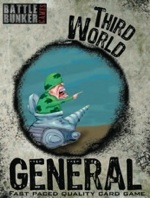
|
About OgreCave and its staff
|

|
by Demian Katz
"Play a card and draw a card" games are becoming nearly as common in the gaming industry as "roll the dice and move around the board" games used to be. This is by no means a bad thing – while roll-and-move games tend to be exercises in tedium, simple card games have a much better chance of being clever, funny, or, at very least, relatively short. Still, the market is starting to feel a little crowded, and Third-World General is a fairly typical example of this genre. The premise is simple: each player is a general in a third-world country. The objective is to gain power without incurring the wrath of the current dictator. This is represented by two scores: Power and Approval. Power starts at zero, and the first player to reach thirty wins; Approval starts at twenty, and dropping to zero forces you out of the game. Cards come in a variety of types – some can be played on yourself, some on opponents; some are one-time effects, others stay on the table indefinitely. The one thing almost all cards have in common is that they cause somebody's scores to go up or down. The game is a balancing act, since cards offering lots of Power tend to also cause significant drops in Approval. It also doesn't pay to eliminate other players too quickly, since a "last man standing" is not allowed to win the game. To make things even more nerve-wracking, the deck contains several "Secret Police" cards which, when drawn, cause an immediate and dramatic drop in both Power and Approval! Unfortunately, while the game isn't completely without excitement, its biggest twist is the need to manage two independent scores, and there isn't much going on beyond that. There isn't a lot of variety in the relatively small deck, a fact which is particularly evident in a four-player game, where there is a potential to reshuffle the discards multiple times, leading to Secret Police encounters ad nauseum. Since there are few opportunities for playing multiple cards or discarding, this problem is compounded, making it possible for certain cards to sit unused and unwanted in the same player's hand for the course of the entire game. A slightly bigger deck with a more interesting variety of special card effects might have made a big difference here. In many cases, subject matter can make up for an uninspiring game design. Third-World General certainly tries to engage players through use of a tongue-in-cheek, black comedy flavor. Unfortunately, the illustrations are (to my eye at least) rather unappealing, and the bland card text does little to add extra life to the game's numerical heart. If anything, the presentation here actually detracts from the game, though I've certainly seen worse.
Conclusions Links:
|
||
 Third-World General
Third-World General